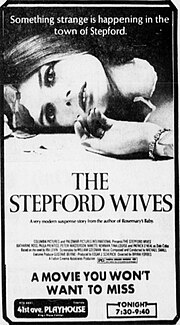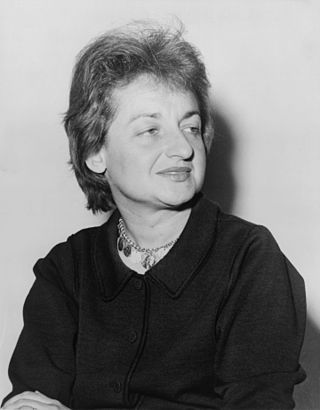
Betty Friedan was an American feminist writer and activist. A leading figure in the women's movement in the United States, her 1963 book The Feminine Mystique is often credited with sparking the second wave of American feminism in the 20th century. In 1966, Friedan co-founded and was elected the first president of the National Organization for Women (NOW), which aimed to bring women "into the mainstream of American society now [in] fully equal partnership with men.”

The Stepford Wives is a 1972 satirical "feminist horror" novel by Ira Levin. The story concerns Joanna Eberhart, a talented photographer, wife, and young mother who suspects that something in the town of Stepford is changing the wives from free-thinking, intelligent women into compliant wives dedicated solely to homemaking. As her friends slowly transform, Joanna realizes the horrific truth.
Equality feminism is a subset of the overall feminism movement and more specifically of the liberal feminist tradition that focuses on the basic similarities between men and women, and whose ultimate goal is the equality of both genders in all domains. This includes economic and political equality, equal access within the workplace, freedom from oppressive gender stereotyping, and an androgynous worldview.
Second-wave feminism was a period of feminist activity that began in the early 1960s and lasted roughly two decades, ending with the feminist sex wars in the early 1980s and being replaced by third-wave feminism in the early 1990s. It occurred throughout the Western world and aimed to increase women's equality by building on the feminist gains of the late 19th and early 20th centuries.
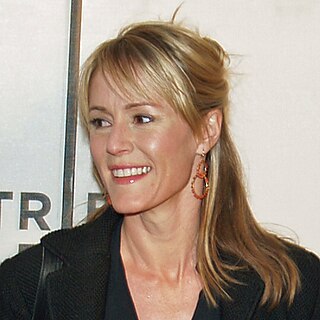
Mary Stuart Masterson is an American actress and director. After making her acting debut as a child in The Stepford Wives (1975), Masterson took a ten-year hiatus to focus on her education. Her early film roles include Heaven Help Us (1985), At Close Range (1986), Some Kind of Wonderful (1987), and Chances Are (1989). Her performance in the film Immediate Family (1989) won her the National Board of Review Award for Best Supporting Actress, and she earned additional praise for her roles in Fried Green Tomatoes (1991) and Benny & Joon (1993).

The Stepford Wives is a 2004 American science fiction black comedy film directed by Frank Oz from a screenplay by Paul Rudnick and starring Nicole Kidman, Matthew Broderick, Bette Midler, Glenn Close, Christopher Walken, and Faith Hill. The second feature-length adaptation of Ira Levin's 1972 novel of the same name following the 1975 film of the same name, it received generally negative reviews from critics and was a box office failure, grossing $103 million worldwide on a $90–100 million budget.

The Feminine Mystique is a book by Betty Friedan, widely credited with sparking second-wave feminism in the United States. First published by W. W. Norton on February 19, 1963, The Feminine Mystique became a bestseller, initially selling over a million copies. Friedan used the book to challenge the widely shared belief that "fulfillment as a woman had only one definition for American women after 1949—the housewife-mother."
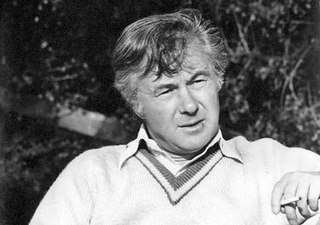
Bryan Forbes CBE was an English film director, screenwriter, film producer, actor and novelist described as a "Renaissance man" and "one of the most important figures in the British film industry".
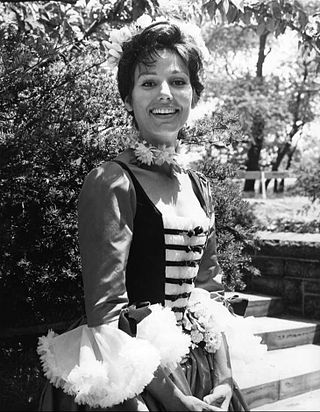
Paula Prentiss is an American actress. She is best known for her film roles in Where the Boys Are (1960), What's New Pussycat? (1965), Catch-22 (1970), The Parallax View (1974), and The Stepford Wives (1975).
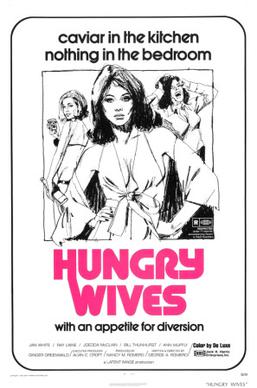
Season of the Witch is a 1972 American drama film written and directed by George A. Romero, and starring Jan White, Raymond Laine, and Anne Muffly. The film follows a housewife in suburban Pittsburgh who becomes involved in witchcraft after meeting a local witch.

Nanette Newman is an English actress and author. She appeared in nine films directed by her husband Bryan Forbes, including Séance on a Wet Afternoon (1964), The Whisperers (1967), Deadfall (1968), The Stepford Wives (1975) and International Velvet (1978), for which she won the Evening Standard Film Award for Best Actress. She was also nominated for the BAFTA Award for Best Actress in a Leading Role for another Forbes-directed film, The Raging Moon (1971).
Peter Masterson was an American actor, director, producer, and writer. He made his Broadway debut in November 1967 in The Trial of Lee Harvey Oswald, playing the title character. Although he got good notices, the play closed after nine performances.
In one scholarly conception, the history of feminism in Poland can be divided into seven periods, beginning with 19th-century first-wave feminism. The first four early periods coincided with the foreign partitions of Poland, which resulted in an eclipse of a sovereign Poland for 123 years.

No, No, Nanette is a 1930 American pre-Code musical comedy film with Technicolor sequences that was directed by Clarence G. Badger and released by First National Pictures. It was adapted from the play of the same title by Otto A. Harbach and Frank Mandel. No, No, Nanette was a popular show on Broadway, running for 321 performances, and was produced and directed by Harry Frazee.

The Stepford Children is a 1987 American made-for-television horror science fiction thriller film inspired by the Ira Levin novel The Stepford Wives. It was directed by Alan J. Levi with a screenplay by Bill Bleich and starring Barbara Eden, Don Murray, Tammy Lauren, Randall Batinkoff and Pat Corley. It is the second in a series of sequels inspired by the 1972 novel and the original 1975 film The Stepford Wives.

The Stepford Husbands is a 1996 American made-for-television thriller-drama film inspired by the Ira Levin novel The Stepford Wives. It was directed by Fred Walton with a screenplay by brothers Ken Wheat and Jim Wheat and starring Donna Mills, Michael Ontkean, Cindy Williams, Sarah Douglas and Louise Fletcher. It is the third in a series of sequels inspired by the 1972 novel and the original 1975 film The Stepford Wives.

Revenge of the Stepford Wives is a 1980 American made-for-television science-fiction thriller film inspired by the Ira Levin novel The Stepford Wives. It was directed by Robert Fuest with a screenplay by David Wiltse and starring Sharon Gless, Julie Kavner, Don Johnson, Arthur Hill, and Audra Lindley. It is the first in a series of sequels inspired by the 1972 novel and the original 1975 film The Stepford Wives.

The Women's Strike for Equality was a strike which took place in the United States on August 26, 1970. It celebrated the 50th anniversary of the passing of the Nineteenth Amendment, which effectively gave American women the right to vote. The rally was sponsored by the National Organization for Women (NOW). Estimates ranged as high as 50,000 women at the protest in New York City and more protested throughout the country. At this time, the gathering was the largest on behalf of women in the United States. The strike, spearheaded by Betty Friedan, self-stated three primary goals: free abortion on demand, equal opportunity in the workforce, and free childcare. The strike also advocated for other second wave feminist goals more generally, such as political rights for women, and social equality in relationships such as marriage.
Jacqueline "Jacqui" Michot Ceballos is an American feminist and activist. Ceballos is the former president of New York Chapter of the National Organization for Women and founder of the Veteran Feminists of America organization which documents the history of Second wave feminism and pioneer feminists. Ceballos' 1971 debate on sexual politics with Norman Mailer and Germaine Greer is recorded in the 1979 film Town Bloody Hall. Ceballos is also featured in the feminist history film She's Beautiful When She's Angry.
Melissa Newman is an American actress who, as a teen, made her Hollywood film debut in The Undefeated (1969) starring John Wayne, Rock Hudson, Lee Meriweather, and Merlin Olsen, among others.

